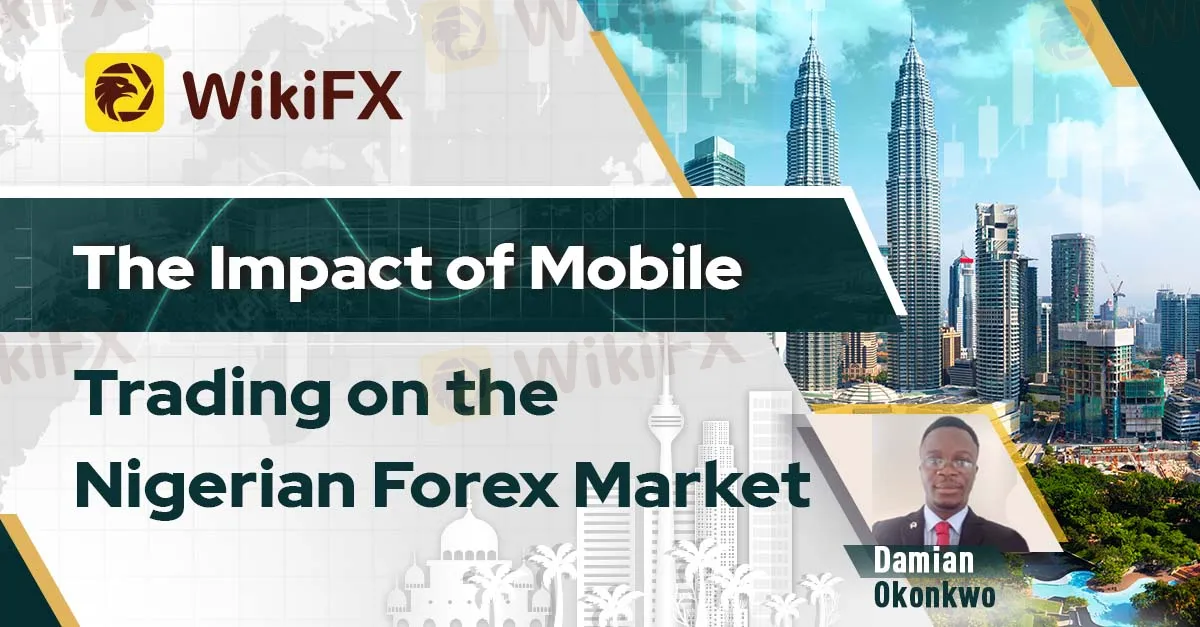简体中文
繁體中文
English
Pусский
日本語
ภาษาไทย
Tiếng Việt
Bahasa Indonesia
Español
हिन्दी
Filippiiniläinen
Français
Deutsch
Português
Türkçe
한국어
العربية
The Impact of Mobile Trading on the Nigerian Forex Market
Abstract:The rise of mobile trading apps has undoubtedly transformed the forex market in Nigeria. By democratising access, fostering convenience, and promoting education, they have brought a new wave of participants and injected fresh dynamism into the system.

By: Damian Okonkwo

Introduction
Across the various regions in Nigeria today; a silent revolution is taking place. Investors are now no longer confined to dimly lit trading floors or the screens of privileged few. In contrast, the world of forex trading is now accessible through a device most Nigerians hold close: their mobile phones. The rise of user-friendly mobile trading apps has democratised access to the forex market, injecting it with a surge of new participants and fundamentally altering its landscape.
Meaning of Mobile Forex Trading

Mobile forex trading refers to buying and selling currencies on the foreign exchange market through a mobile app on your smartphone or tablet. It allows you to trade currencies from anywhere in the world, as long as you have an internet connection.
Impact of Mobile Trading on the Nigerian Forex Market
1. Democratization and Inclusion: Prior to the mobile app revolution, forex trading in Nigeria was largely the domain of institutional investors and a small pool of tech-savvy individuals. Complex platforms, high minimum deposits, and limited internet access kept the doors firmly shut for the majority. Mobile apps shattered these barriers. With intuitive interfaces, low investment thresholds, and data accessibility even in remote areas, they opened the doors to a diverse range of Nigerians, including young professionals, students, and even those traditionally excluded from financial systems. This surge in participation has undoubtedly deepened the market, increasing liquidity and potentially leading to greater price discovery.
2. Convenience and Accessibility: Gone are the days of being chained to a desktop terminal. Mobile apps offer unparalleled convenience, allowing Nigerians to trade anytime, anywhere. Whether commuting, during lunch breaks, or even late at night, they can monitor market movements, analyze trends, and execute trades with just a few taps. This flexibility caters to the dynamic lifestyles of many Nigerians and empowers them to participate in the market even with limited time or resources.
3. Education and Awareness: Mobile apps often come bundled with educational resources, market news feeds, and even trading tutorials. This democratizes access to financial knowledge, fostering a culture of informed trading among new participants. Additionally, social features within some apps allow users to connect and share strategies, fostering a sense of community and collective learning. This educational aspect can help mitigate the risks associated with uninformed trading, potentially leading to a more stable and sustainable market.
Challenges and Concerns
While the impact of mobile trading has been largely positive, some challenges remain. The lack of robust regulatory frameworks for retail forex trading in Nigeria leaves many users vulnerable to fraudulent activities and unfair practices by some brokers. Additionally, the inherent volatility of the forex market, coupled with the ease of access provided by mobile apps, can lead to reckless trading behavior and significant losses for inexperienced individuals.
The Road Ahead
As mobile trading continues to evolve in Nigeria, addressing these challenges is crucial. Regulatory bodies need to implement proper frameworks to protect retail investors and ensure fair market practices. Furthermore, financial literacy initiatives and responsible trading education within mobile apps themselves can equip users with the knowledge and skills needed to navigate the market safely and effectively.
Conclusion
The rise of mobile trading apps has undoubtedly transformed the forex market in Nigeria. By democratizing access, fostering convenience, and promoting education, they have brought a new wave of participants and injected fresh dynamism into the system. However, addressing regulatory gaps and promoting responsible trading practices remain crucial to ensure the continued success and sustainability of this mobile-driven revolution. As Nigeria embraces the digital age, one thing is certain: the pocket trader is here to stay, and their impact on the forex market is only just beginning.

Disclaimer:
The views in this article only represent the author's personal views, and do not constitute investment advice on this platform. This platform does not guarantee the accuracy, completeness and timeliness of the information in the article, and will not be liable for any loss caused by the use of or reliance on the information in the article.
Read more

SocialFi and the Forex Market: A New Era for Decentralized Social Trading?
The worlds of social media and decentralized finance (DeFi) have converged under a new banner—SocialFi. Short for “Social Finance,” SocialFi leverages blockchain technology to reward user engagement, giving individuals direct control over their data and interactions. While SocialFi has primarily emerged in the context of content creation and crypto communities, its principles could soon revolutionize the forex market by reshaping how traders share insights and monetize social influence.

Do This ONE Thing to Transform Your Trading Performance Forever
The story is all too familiar. You start trading with high hopes, make some quick profits, and feel like you've finally cracked the code. But then, just as fast as your gains came, they disappear. Your account balance dwindles, and soon you’re left wondering what went wrong. Worse still, fear and confusion creep in, making every new trade a stressful gamble rather than a calculated decision. If this cycle sounds familiar, you’re not alone.

Check Yourself: Are You Always Rushing for Trades?!
With market fluctuations happening in real-time and profits hinging on split-second decisions, many traders develop an impulse to act quickly. But have you ever stopped to ask yourself: Am I rushing into trades? If you’re constantly clicking “Buy” or “Sell” in a flurry of excitement or anxiety, you may be falling into a dangerous trap that could cost you more than you realise.

How to Avoid Risks from Scam Brokers in Forex Investment?
In recent years, the forex market has become a popular choice for global investors due to its high liquidity and 24-hour trading advantages. However, according to the recently concluded WikiFX "3·15 Forex Rights Protection Day " event, we received over 6,000 pieces of evidence exposing rights violations within a short period. This reflects that, although the forex industry is becoming more regulated, fraudulent platforms continue to emerge, causing significant suffering for many victims.
WikiFX Broker
Latest News
Enlighten Securities Penalized $5 Million as SFC Uncovers Risk Control Failures
Why Are Financial Firms Adopting Stablecoins to Enhance Services and Stability?
Experienced Forex Traders Usually Do This Before Making a Lot of Money
Octa vs XM:Face-Off: A Detailed Comparison
When High Returns Go Wrong: How a Finance Manager Lost RM364,000
Bridging Trust, Exploring Best—WikiEXPO Hong Kong 2025 Wraps Up Spectacularly
Interactive Brokers Expands Crypto Trading with Solana, XRP, Cardano, and Dogecoin
Fidelity Investments Explores Stablecoin Innovation in Digital Assets Sector
Why More People Are Trading Online Today?
SEC Ends Crypto.com Probe, No Action Taken by Regulator
Currency Calculator







